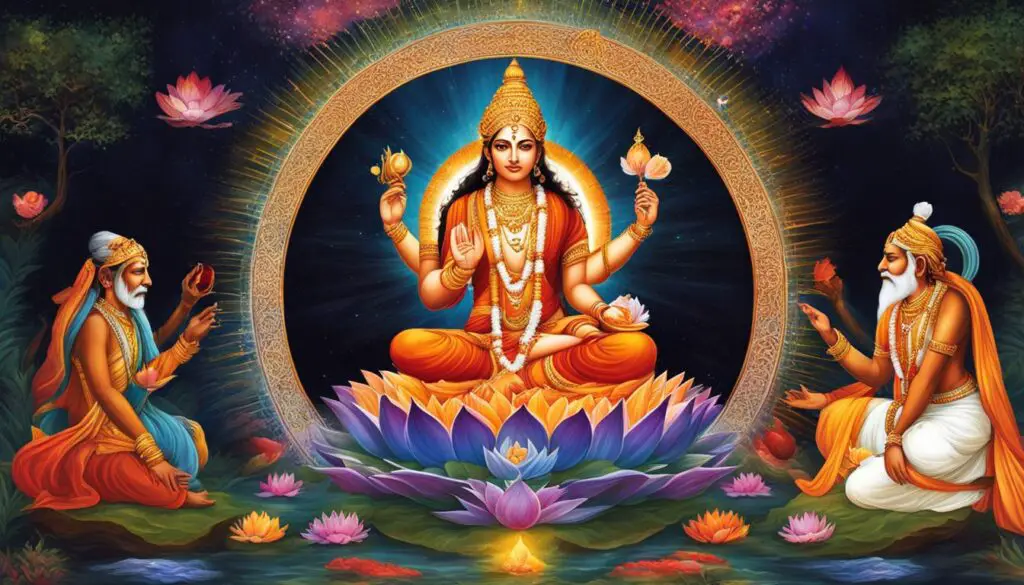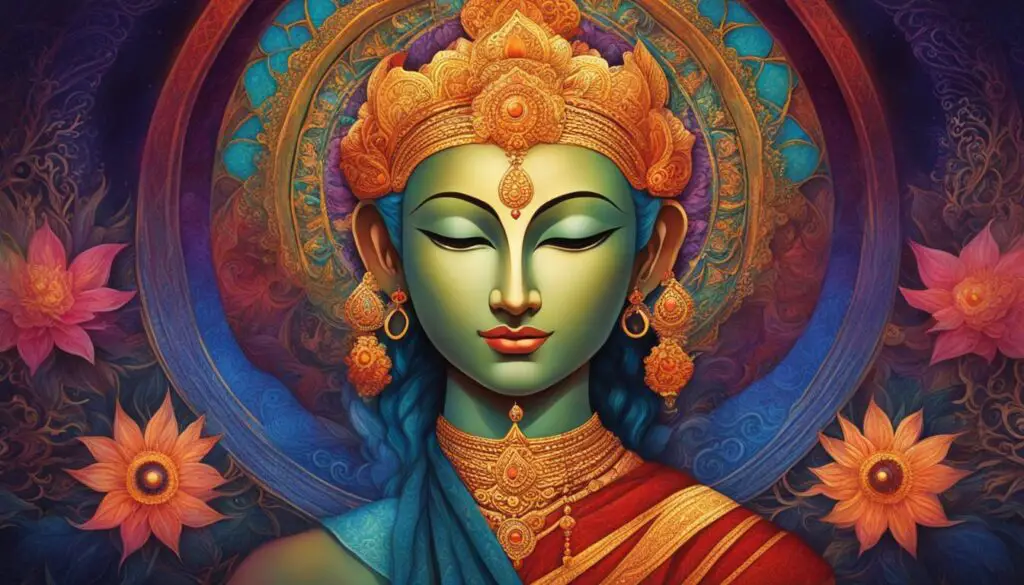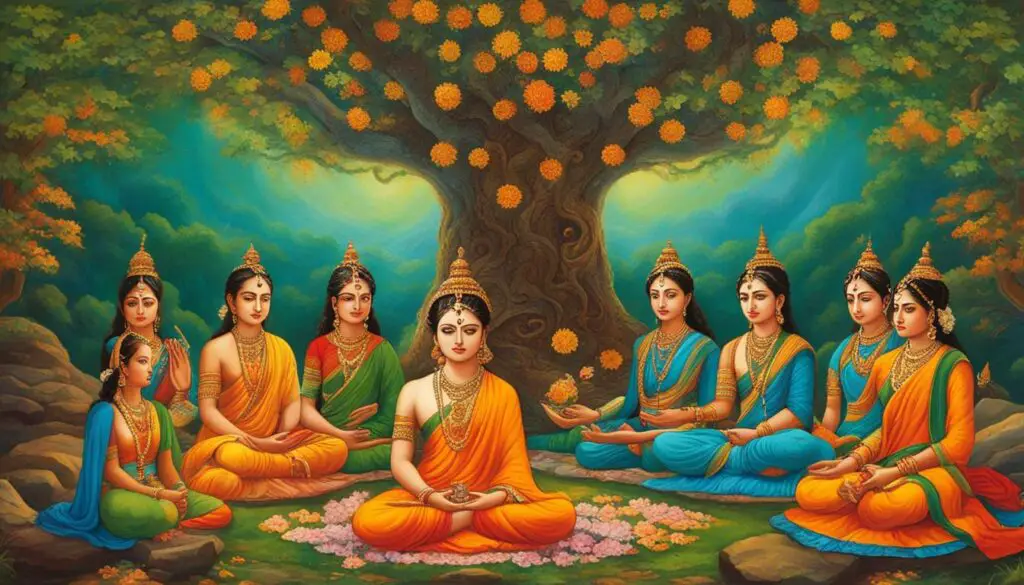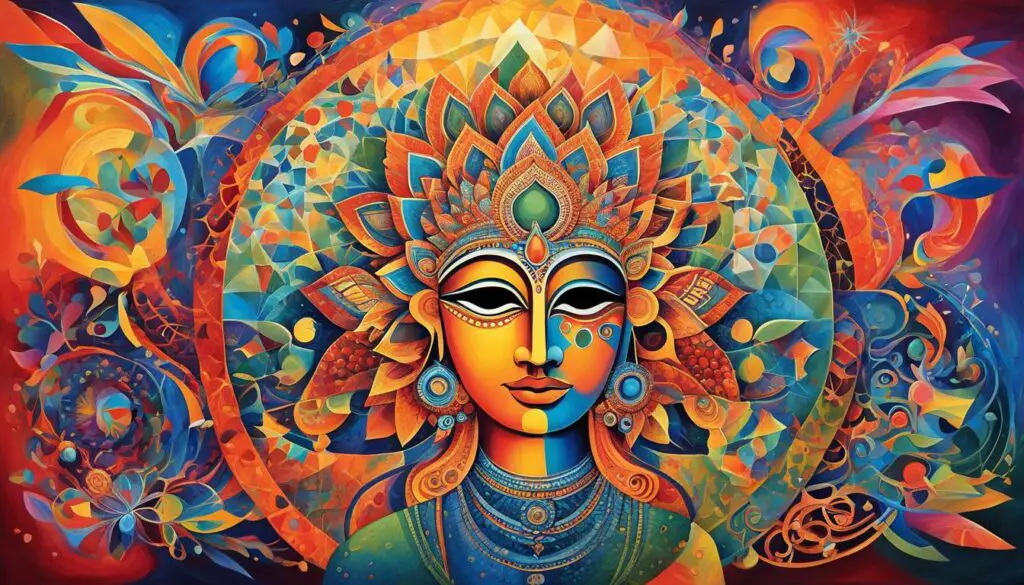A Vedanta Philosophy It is an ancient tradition in India that encompasses different sects and interpretations. The term Vedanta means “the end of the Vedas”, which are the sacred scriptures of Hinduism. In the West, the term Vedas generally refers to hymns and rituals, but in India, it is related to Vedanta. Vedanta is considered the foundation of different Hindu philosophical systems and is based on Vyasa's sutras. There are three main categories within Vedanta: dualism, qualified non-dualism and non-dualism. A Vedanta philosophy aims to seek self-knowledge and transcendence.
Main points summarized:
- A Vedanta Philosophy It is an ancient tradition in India that encompasses different interpretations.
- Vedanta means “the end of the Vedas”, the sacred scriptures of Hinduism.
- Vedanta is the basis of several Hindu philosophical systems and aims at self-knowledge and transcendence.
- There are three main categories within Vedanta: dualism, qualified non-dualism and non-dualism.
- Vedanta philosophy has influenced Western society and continues to evolve through Modern Vedanta.
History of Vedanta Philosophy
A history of Vedanta Philosophy dates back thousands of years. Over time, it went through different phases that shaped its fundamental concepts and broadened its perspectives. The formative phase, which occurred between approximately 1000 BC and 300 BC, was marked by the influence of the Upanishads, the Bhagavad Gita and the Brahma-Sutras, which established the foundations of Vedanta. These sacred texts deepened teachings about the nature of the universe, the soul, and the quest for spiritual knowledge.
Then came the scholastic phase, which extended from the 8th century to the 13th century A.D. During this period, great masters like Shankara expanded the original views of Vedanta, establishing different philosophical schools and religious sects. These schools differed in their interpretations of Vedanta, but they all shared the common goal of achieving spiritual liberation.
The modern phase of Vedanta Philosophy began in the 19th century with Sri Ramakrishna and Swami Vivekananda. These masters renewed Vedanta, adapting it to the challenges and needs of the modern world. They drew attention to the importance of universal love, religious harmony, and spiritual practice as paths to personal fulfillment and social transformation. It was at this time that Vedanta became a universal philosophy of life, transcending cultural and geographical boundaries.

A history of Vedanta Philosophy is a fascinating journey that reflects the human search for truth and spiritual enlightenment. Its different phases highlight the evolution of teachings and their influence on society over time.
Main Teachings of Vedanta Philosophy
Vedanta Philosophy is based on three essential principles that guide its teachings and practices. These principles are fundamental to understanding the Vedantic approach to existence, spirituality and transcendence.
1. Unity of All Existence: Vedanta preaches that the universe is composed of the same essence, a single reality underlying all things. This unity is expressed through the concept of Brahman, the absolute and universal reality. Understanding the unity of all existence is fundamental to the Vedantic spiritual journey.
2. Divinity of the Human Soul: According to Vedanta, all human beings have a divine and immutable spiritual inheritance. The individual soul, known as Atman, is considered a reflection and an intrinsic part of Brahman, the ultimate reality. Recognizing the divinity within is one of the main teachings of Vedanta.
3. Universality of All Religions: Vedanta values religious plurality and believes that all religions have their value and can lead to spiritual fulfillment. Although Vedanta is a Hindu tradition, its teachings transcend religious barriers and recognize truth in all spiritual traditions.
Through these principles, Vedanta seeks to awaken self-knowledge, enlightenment and liberation from the cycle of births and deaths. Direct knowledge of the true nature of the Self and divinity is the path to achieving spiritual realization and transcending the limitations of the material world.
| Principles of Vedanta Philosophy |
|---|
| Unity of All Existence |
| Divinity of the Human Soul |
| Universality of All Religions |

These Vedantic teachings can be applied not only in the religious context, but also in everyday life, helping to understand the nature of reality, the search for truth and living a spiritually meaningful life.
Vedanta Spiritual Practices
Vedanta offers a variety of spiritual practices to achieve self-knowledge and transcendence. These practices are fundamental for those seeking to deepen their understanding of Vedantic teachings and live a spiritually enriching life.
Meditation
Meditation plays a central role in spiritual practices of Vedanta. Through meditation, we can calm the agitated mind and develop deeper inner awareness. With regular meditation practice, we can access states of peace, mental clarity and connection with the highest self.
Self-control and Discipline
Vedanta emphasizes the importance of self-control and discipline, both mental and physical. By cultivating discipline in our daily activities, we are able to direct our energy towards the pursuit of self-knowledge. Self-control helps us overcome desires and develop the inner strength necessary to follow the spiritual path.
Search for Knowledge
In Vedanta, the pursuit of knowledge is an essential practice. This involves studying sacred scriptures such as the Upanishads and the Bhagavad Gita to deepen our understanding of Vedantic teachings. Through diligent study, we can expand our understanding of self and the nature of the universe.
Selfless Service
The practice of selfless service is valued in Vedanta. Through service to others, we can develop detachment and cultivate compassion. Selfless service reminds us that we are all interconnected and allows us to express love and kindness toward others.
Search for Truth
The search for truth is an essential practice of Vedanta. This involves questioning our beliefs and preconceived ideas, seeking truth in all areas of life. Through this quest, we can expand our awareness and understanding of ultimate reality.
Practice these different spiritual practices of Vedanta it allows us to delve deeper into Vedantic teachings and experience inner transformation. These practices enable us to cultivate inner peace, find purpose and meaning in our lives, and achieve spiritual fulfillment. Whether through meditation, self-control, study, selfless service, or the pursuit of truth, spiritual practices of Vedanta invite us to discover our true being and realize our highest potential.

Vedanta Philosophy in the West
Vedanta Philosophy has gained recognition and admirers in the West due to the efforts of spiritual masters such as Swami Vivekananda and Swami Sivananda. They dedicated their lives to spreading the teachings of Vedanta through lectures, writings and the establishment of Vedantic institutions.
A modern Vedanta in the West combines the ancient wisdom of the Vedanta tradition with the discoveries and perspectives of Western science and philosophy. This interaction between different schools of thought allowed Vedanta to adapt to the specific challenges and needs of Western society.
Nowadays, there are several organizations and Vedanta study centers spread across the Western world. These places offer the opportunity to delve deeper into the richness of Vedantic teachings and explore the paths to self-knowledge and transcendence, according to a contemporary approach.
Swami Vivekananda
“Vedanta teaches man to discover the divinity present within himself.”
Swami Sivananda
“Vedanta brings true freedom and eternal joy through knowledge of the inner Self.”
The influence of Vedanta Philosophy in the West continues to grow as more people become interested in a deeper spiritual quest and a more comprehensive understanding of life. A modern Vedanta in the West offers a bridge between Eastern and Western traditions, promoting intercultural and interdisciplinary dialogue for the benefit of all who seek wisdom and enlightenment.

Vedantic organizations in the West:
- Vedanta Society of the West
- Vedanta Society of Southern California
- Vedanta Society of New York
- Vedanta Society of Northern California
These organizations offer lectures, courses, retreats and other activities related to Vedanta, providing those interested with a space to explore and practice the teachings of this spiritual tradition.
Masters of Vedanta Philosophy
Vedanta Philosophy has had several masters throughout its history. Some of the best known are Swami Vivekananda, Ramana Maharshi, Swami Sivananda and Aurobindo Ghose. They were responsible for bringing new insights and perspectives to Vedanta, renewing it and making it relevant for modern times. These masters also founded Vedantic institutions and spread the teachings of Vedanta in the West, contributing to its spread and popularity.

Vedanta Philosophy has had several masters throughout its history. Some of the best known are Swami Vivekananda, Ramana Maharshi, Swami Sivananda e Aurobindo Ghose.
These masters were responsible for bringing new insights and perspectives to Vedanta, renewing it and making it relevant for modern times. Their contributions have been fundamental to the understanding and dissemination of Vedanta Philosophy in the West. Additionally, they founded Vedantic institutions that allow the teachings of Vedanta to continue to be spread and shared with others interested in the pursuit of self-knowledge and spiritual transcendence.
Vedanta Philosophical Tradition in India
A Vedanta philosophical tradition in India it is widely practiced and valued. Vedanta philosophy is taught in numerous academic and spiritual institutions across the country. There are several sadhus and Vedantic monks who follow the principles and practices of Vedanta. India is considered the spiritual birthplace of Vedanta, and its philosophical tradition continues to impact the lives and culture of the Indian people.
The teachings of Vedanta are passed down from generation to generation, keeping alive the philosophical tradition that dates back millennia. In academic institutions, students learn about the philosophy, history and different interpretations of Vedanta. Vedantic sadhus and monks dedicate their lives to spiritual practice and the dissemination of the teachings of Vedanta.
A Vedanta philosophical tradition in India exerts a profound influence on Indian society. It shapes the beliefs, values and spiritual practices of the Indian people. Through Vedanta, Indians find spiritual guidance, a purpose in life, and a deeper understanding of the world and the Self.
Vedanta not only influences the spiritual aspects of Indian life, but also permeates the country's culture, art, literature and philosophy. The philosophy and principles of Vedanta are deeply intertwined in the religious traditions and everyday practices of Indians.
In summary, the Vedanta philosophical tradition in India it is an inseparable part of Indian life. It is transmitted from generation to generation, keeping the ancestral wisdom of Vedanta alive. Through its academic institutions, sadhus and Vedantic monks, India continues to preserve and enrich this philosophical tradition that has been a source of spiritual inspiration and personal transformation for millions of people.

Impact of Vedanta Philosophy on Society
Vedanta Philosophy has a significant impact on society. His teachings promote religious tolerance, acceptance of different spiritual paths and the search for self-knowledge. Vedanta inspires the practice of selfless service and the search for truth, leading to a more just and understanding society.
The principles of Vedanta encourage peaceful coexistence between different religious traditions, emphasizing the fundamental unity of all existence. This helps people cultivate respect and empathy towards the different belief systems present in our modern society.
“The search for truth is one of the main concerns of Vedanta. Through self-inquiry and the study of sacred texts, Vedantic practitioners are encouraged to develop a deeper understanding of the nature of existence and themselves.”
Vedanta Philosophy has also influenced various fields of knowledge, such as literature, art, psychology and Western philosophy. His teachings on the nature of the mind and the quest for self-knowledge have inspired writers, artists and researchers to explore new perspectives and expand the horizons of human thought.

Furthermore, the practice of selfless service, which is encouraged by Vedanta, has the potential to transform society by promoting care and respect for other human beings. By serving those in need and contributing to the common good, Vedantic practitioners become agents of social change, nurturing a sense of responsibility towards the collective.
Vedanta in modern society:
- Promotes inner peace and harmony between individuals.
- Stimulates the search for self-knowledge and personal fulfillment.
- It inspires the practice of selfless service and care for others.
- Contributes to the acceptance of different religious paths.
- It influences several fields, such as literature, art and philosophy.
Vedanta Philosophy continues to play a relevant role in today's society, offering guidelines and profound insights for those seeking a more meaningful life and a deeper understanding of existence.
Vedanta Spiritual Practices
Vedanta offers different spiritual practices to achieve self-knowledge and transcendence. One of the fundamental practices is meditation, which plays an important role in Vedanta. Through meditation, it is possible to calm the agitated mind and develop inner awareness, allowing a greater connection with the deeper self.
In addition to meditation, Vedanta also emphasizes self-control and discipline, both mental and physical. By controlling thoughts and actions, it is possible to cultivate a clearer and more focused mind, facilitating the process of self-realization.
The search for knowledge is another practice valued in Vedanta. Through studying sacred texts such as the Upanishads and the Bhagavad Gita, it is possible to deepen your understanding of Vedantic teachings and gain deeper spiritual insights.
“Through meditation, it is possible to calm the agitated mind and develop inner awareness, allowing a greater connection with the deeper self.”
The practice of selfless service is also valued in Vedanta. By putting Vedantic principles into action through service to others, it is possible to cultivate a generous and compassionate heart, promoting harmony and peace in oneself and in society.
Finally, Vedanta also encourages the search for truth in all areas of life. Through the constant search for truth and alignment with spiritual purpose, it is possible to live an authentic and meaningful life.
Vedanta Spiritual Practices:
- Meditation
- Self-control and discipline
- Search for knowledge
- Selfless service
- Search for truth in all areas of life
These spiritual practices are an integral part of the Vedantic path and help in spiritual development and the search for self-realization. By incorporating these practices into our daily lives, we can experience greater inner peace, wisdom, and connection with the divine.

Modern Vedanta
Modern Vedanta is a living movement that combines the ancient wisdom of Vedanta with the latest discoveries in Western science and philosophy. It is always evolving and adapting to the needs of the modern world.
Modern Vedanta emphasizes the importance of personal experience and spiritual practice as paths to achieving understanding of the Supreme Being and inner transformation.
It began in the 19th century and has the contribution of several spiritual masters, who brought a contemporary approach to the Vedantic tradition.
One of the main aspects of Modern Vedanta is the integration of Western scientific and philosophical discoveries with the traditional teachings of Vedanta. This allows for a broader and deeper understanding of human nature, consciousness and the spiritual quest. Modern Vedanta values rationality, interreligious dialogue and the practical application of teachings in everyday life.

The legacy of the masters of Modern Vedanta
Modern Vedanta owes much to the work and contributions of prominent spiritual masters, who have brought a contemporary perspective to the Vedantic tradition. Some of these masters include:
- Swami Vivekananda: Known as the chief disciple of Sri Ramakrishna, he played a pivotal role in introducing Vedanta to the West and spreading Vedantic teachings throughout the world.
- Ramana Maharshi: An Indian sage who emphasized the practice of self-inquiry to achieve self-realization. His teachings profoundly influenced Modern Vedanta.
- Swami Sivananda: Founder of the Divine Life Society, an organization dedicated to the dissemination of Vedantic wisdom and the practice of yoga. He presented a practical and holistic approach to Vedantic spirituality.
- Aurobindo Ghose: An Indian philosopher and sage who developed an integral approach to spirituality, combining Vedantic practices with physical and psychological disciplines.
These masters and many others have left a lasting legacy on Modern Vedanta, influencing the way it is studied, practiced, and disseminated throughout the world.
Conclusion
Vedanta Philosophy, an ancient tradition rooted in India, offers a profound path to achieving self-knowledge and transcendence. Its scope includes different sects and interpretations, which demonstrates the richness and diversity of this philosophy. Its impact on society is notable, reflected in the appreciation of the search for knowledge, spiritual practice and the acceptance of different religious paths.
Vedanta has been successfully spread in the West, adapting to modern times through the so-called Modern Vedanta. This movement aims to harmonize the ancient wisdom of Vedanta with Western scientific and philosophical advances, thus allowing it to be understood and practiced in a way that is relevant to people in the Western world.
Through its teachings and practices, Vedanta seeks to promote inner peace, wisdom and compassion among human beings. She teaches the importance of seeking self-knowledge, overcoming the limitations of the mind and awakening to our true spiritual nature. With an inclusive vision, Vedanta values the search for a state of harmony and balance, not only individually, but also in relation to others and the world around us.
FAQ
Q: What is Vedanta Philosophy?
A: Vedanta Philosophy is an ancient tradition from India that encompasses different sects and interpretations. It seeks self-knowledge and transcendence, and is based on Vyasa's sutras.
Q: What is the history of Vedanta Philosophy?
A: Vedanta Philosophy dates back thousands of years and has gone through different phases over time. The formative phase occurred from approximately 1000 BC to 300 BC, the scholastic phase occurred from the XNUMXth century to the XNUMXth century AD, and the modern phase begins in the XNUMXth century.
Q: What are the main teachings of Vedanta Philosophy?
To the main teachings of Vedanta Philosophy they include the unity of all existence, the divinity of the human soul, and the universality of all religions.
Q: What are the spiritual practices of Vedanta?
A: The spiritual practices of Vedanta include meditation, self-control, mental and physical discipline, seeking knowledge, studying the holy scriptures, and practicing selfless service.
Q: How did Vedanta Philosophy spread in the West?
A: Vedanta Philosophy spread in the West mainly due to the efforts of spiritual masters such as Swami Vivekananda and Swami Sivananda, who traveled to the West, gave lectures, wrote books and established Vedantic institutions.
Q: Who are some of the masters of Vedanta Philosophy?
A: Some of Masters of Vedanta Philosophy include Swami Vivekananda, Ramana Maharshi, Swami Sivananda and Aurobindo Ghose.
Q: How is the Vedanta Philosophical Tradition practiced in India?
A: The Vedanta Philosophical Tradition is widely practiced in India, being taught in several academic and spiritual institutions, and followed by sadhus and Vedantic monks.
Q: What is the impact of Vedanta Philosophy on society?
A: Vedanta Philosophy promotes religious tolerance, the search for self-knowledge, the practice of selfless service and the search for truth, positively impacting society.
Q: What are the spiritual practices of Vedanta?
A: The spiritual practices of Vedanta include meditation, self-control, mental and physical discipline, seeking knowledge, studying the holy scriptures, and practicing selfless service.
Q: What is Modern Vedanta?
A: Modern Vedanta is a living movement that combines the ancient wisdom of Vedanta with the latest discoveries in Western science and philosophy. She emphasizes the importance of personal experience and spiritual practice in achieving understanding of the Supreme Being and inner transformation.






